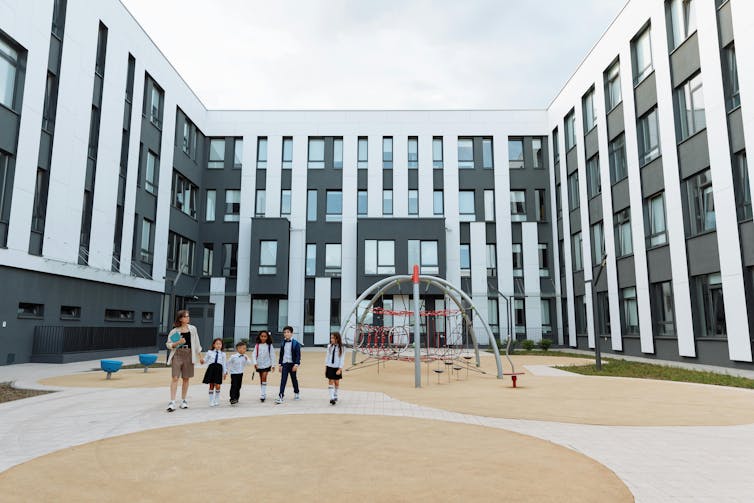New South Wales private school teachers are pushing for a pay rise with the help of their union.
One of the main arguments is their pay should be higher than that of public and Catholic school teachers, to reflect a “traditional premium” for working in the private (or independent) sector.
This follows a 2023 state government-funded pay rise to teachers at public schools in NSW. This raised starting salaries from A$75,791 to $85,000 and the top salaries from $113,042 to $122,100. Private school teachers are now asking for 5–7% above their public colleagues.
What’s behind the idea that private school teachers earn more?
How is private school teachers’ pay decided?
Before the 1960s, there were very few independent schools in Australia. Most were governed by church groups and set their own fees, the bulk of which went to staff salaries. Salaries were often higher than in government schools, but there were other complicating factors.
Many of these schools had boarding facilities, so meals and accommodation (for some staff) formed part of their employment benefits. Staff were also required to run extensive co-curricular activities (such as sport or music). But this was often seen to be compensated by longer holidays.
Then, in the 1970s and ‘80s, there was an explosion in the number of low-fee independent schools. This meant there was a huge variety of arrangements for teachers’ pay. Most of the newer schools did not require weekend commitments for teachers, even though many still paid higher than government schools. But this was not always the case, depending on the resources of the school.
When Work Choices (a new workplace relations system) came in under the Howard government in 2005, salaries for a range of private school teachers were streamlined in the form of “multi-enterprise agreements”. In NSW, this brought many (though not all) independent schools into a common agreement on salaries through the Association of Independent Schools. However, some schools have continued to set their own pay.

Why is the pay different?
Advocates for independent schools, which include principals and union leaders, argue their teachers should be paid more because of the extra demands of their jobs.
As a condition of employment, they are expected to contribute to the wider cultural life of the school beyond face-to-face teaching. This can include co-curricular activities such as coaching a sport team, before- or after-school music groups, theatre productions, community service activities and comprehensive pastoral care programs.
Attendance is expected at out-of-hours events such as parent/caregiver information evenings, open days, and for some faith-based schools, religious services. There’s often an expectation of frequent communication with parents/caregivers. Some of these expectations are similarly required of teachers in government and Catholic system schools. But those advocating for these salary increases maintain that independent school expectations are greater.
Teachers in NSW government schools have specified hours of face-to-face teaching. There are no similar provisions for independent school teachers, so this is up to individual schools.

It’s not just about pay
The union representing NSW independent school teachers is not just calling for a pay rise. It also wants to see improvements to teachers’ workloads, which is also an issue for government school teachers.
The Independent Education Union wants clear standards around teaching hours, meetings, extra classes and weekend activities. It also wants teachers to have the “right to disconnect” (or refuse work contact after work hours), which some schools are trying to oppose.
What does this mean for the teacher shortage?
Australia is in the grip of a nationwide teacher shortage.
So it is possible increasing salaries for private school teachers could see some teachers leave their public or low-fee Catholic schools. This is particularly so if the new school does not involve huge amounts of additional travel and/or extra hours.
But given many private school teaching salaries come with extra time commitments, teachers would be weighing up the pros and cons of a move.

